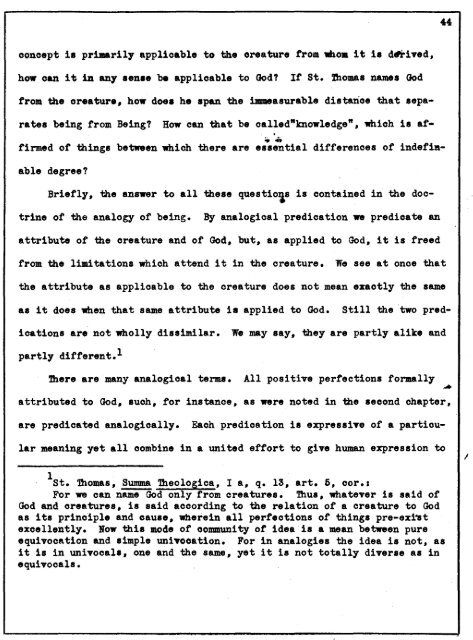Natural Knowledge of God in the Philosophy of Saint Thomas Aquina
You also want an ePaper? Increase the reach of your titles
YUMPU automatically turns print PDFs into web optimized ePapers that Google loves.
44<br />
oonoept i8 primarily applioable to <strong>the</strong> oreature from whoa it i8 d~ived,<br />
how oan it iD any sense be applioable to <strong>God</strong>?<br />
It St. ihoDl&s names <strong>God</strong><br />
.....<br />
from <strong>the</strong> oreature, how does he span <strong>the</strong> immeasurable distarioe that separates<br />
be<strong>in</strong>g trom Be<strong>in</strong>g? How can that be oalled"knowledge", which is af-<br />
firmed ot th<strong>in</strong>gs between which <strong>the</strong>re are esaential differenoes ot <strong>in</strong>detiftable<br />
degree?<br />
Brietly, <strong>the</strong> answer to all <strong>the</strong>se questioi. is oonta<strong>in</strong>ed <strong>in</strong> <strong>the</strong> dootr<strong>in</strong>e<br />
ot <strong>the</strong> analogy <strong>of</strong> be<strong>in</strong>g.<br />
By analogioal predication we predicate an<br />
attribute ot <strong>the</strong> oreatureand ot <strong>God</strong>, but, as applied to <strong>God</strong>, it is treed<br />
trom <strong>the</strong> lim! tations whioh attend it <strong>in</strong> <strong>the</strong> oreature. We see at onoe that<br />
<strong>the</strong> attribute as applicable to <strong>the</strong> creature does not mean exactly <strong>the</strong> same<br />
a8 it does when that same attribute is applied to <strong>God</strong>.<br />
Still <strong>the</strong> two predications<br />
are not wholly dissimilar. We may say, <strong>the</strong>y are partly alike and<br />
partly ditterent. l<br />
7bere are many analogical terms.<br />
All positive pertections tormally<br />
attributed to <strong>God</strong>, suoh, for <strong>in</strong>stanoe, as were noted <strong>in</strong> <strong>the</strong> seoond ohapter,<br />
are predicated analogioally. Eaoh predioation is expressive ot a partioular<br />
mean<strong>in</strong>g yet all oomb<strong>in</strong>e <strong>in</strong> a united ettort to give human expression to<br />
I<br />
1 st. <strong>Thomas</strong>, Summa Theologioa, I a, q. 13, art. 5, oor.1<br />
For we oan name <strong>God</strong> only from creatures. '!hus, whatever is said ot<br />
<strong>God</strong> and oreatures, is said aooord<strong>in</strong>g to <strong>the</strong> relation ot a creature to <strong>God</strong><br />
as its pr<strong>in</strong>oiple and oause, where<strong>in</strong> all pertections ot th<strong>in</strong>gs pre-exi'st<br />
excellently. Bow this mode ot oommunity ot idea is a mean between pure<br />
equivocation and simple univoo_tion. For <strong>in</strong> analogies <strong>the</strong> idea is not, as<br />
it is <strong>in</strong> univocal., one and <strong>the</strong> same, yet it is not totally diver.e aa <strong>in</strong><br />
equivocals.


















